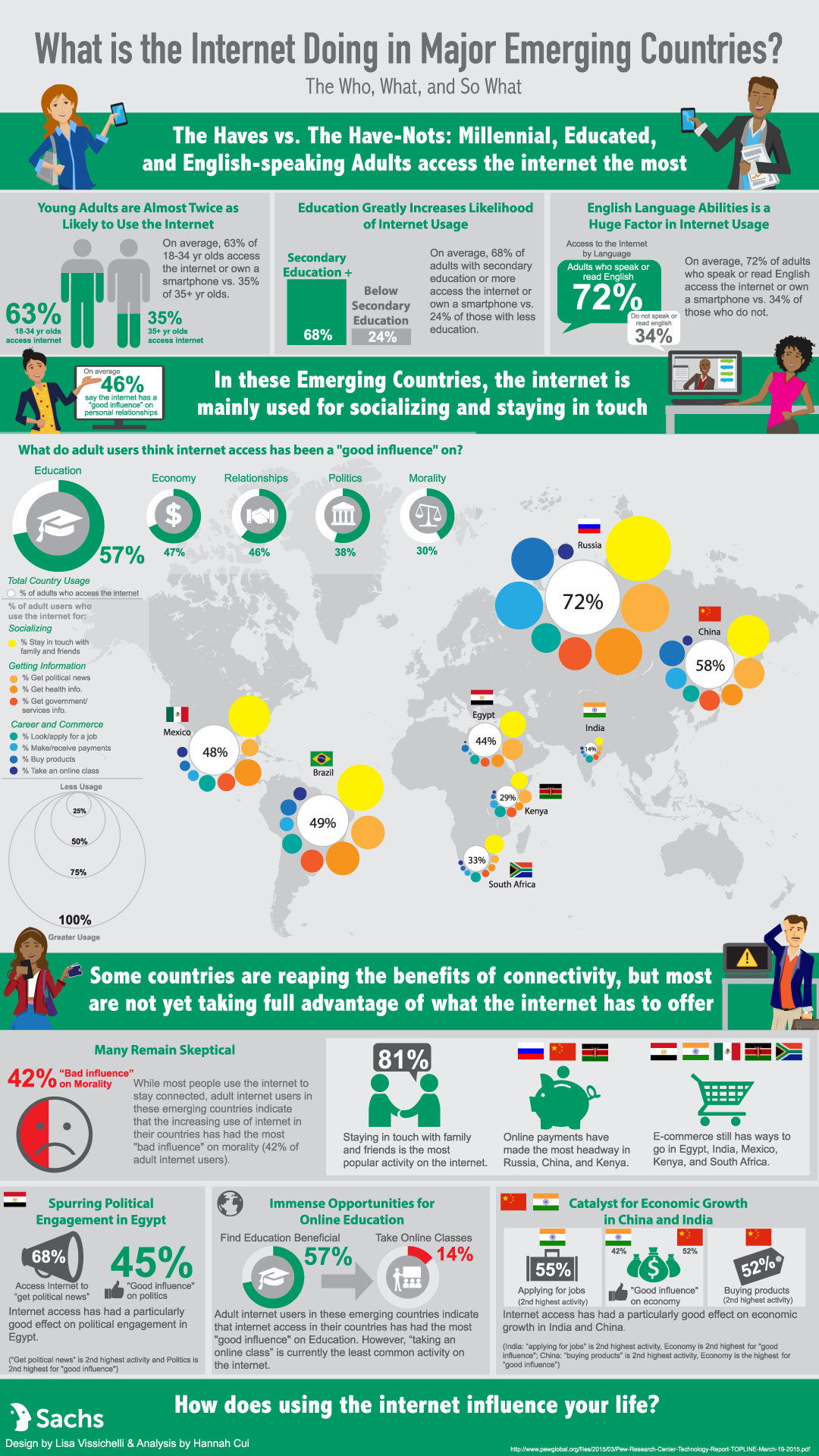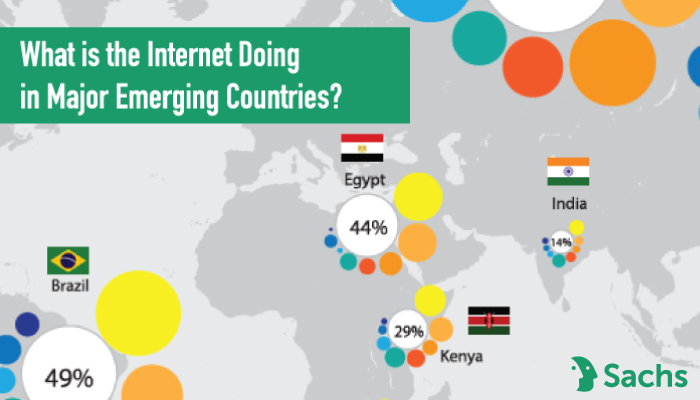

2015 Information is Beautiful Award winner in the Infographic Long List
For many of us in Western developed countries, the internet is ubiquitous and part of almost everything we do. What about in emerging countries?
At Sachs, we explored this question for the Wikiprogress Data Visualization Contest. The contest asked entrants to create an infographic or data visualization that addresses the multi-dimensionality of well-being (for specific prompts you can check out the contest webpage.)
To start our analysis, we defined “well-being” along 7 dimensions (social, occupational, physical, emotional, spiritual, intellectual, and environmental) as a guide. Data points that we would discover to illustrate impact on well-being can be mapped back to one of these 7 dimensions. Then drawing upon raw data from the Pew Research Center’s Spring 2014 Global Attitudes survey, we chose 8 “major” emerging countries to focus on: Russia, China, India, Egypt, Kenya, South Africa, Mexico, and Brazil.
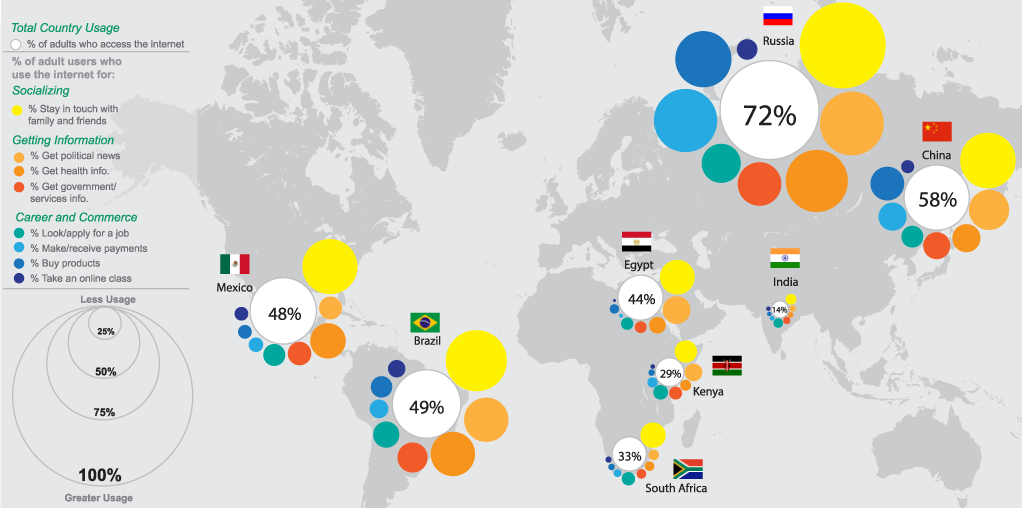
e analyzed data pertaining to internet users to show the nuances of who is using the internet (adults 18+) in these 8 countries, what activities the internet is primarily used for, and how internet usage affects different populations. By drawing links between user perceptions of the internet’s influence and popular online activities, we aimed to paint a multi-dimensional picture of how internet usage impacts well-being in these countries.
Upon digging into the data, we saw that internet users in emerging countries are like those in the US in many ways. Across the board, staying in touch with family and friends is the most popular online activity (81% of adult internet users engage in this activity, on average.) Also much like the demographic of internet users in the US, young adults and more educated adults (on average) are much more likely to access the internet than are older adults (35+ year olds in emerging countries) and those with less education, respectively. Furthermore, adults who speak or read English are also more likely to access the internet, (72% vs. 34%) revealing there is ample opportunity for web development in their native languages.
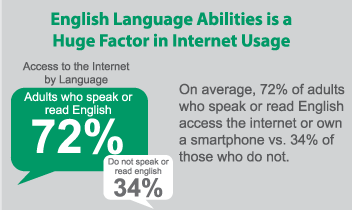
When asked what kind of influence the increasing use of the internet has had on their lives, the highest percentage of adult users in these countries (57% on average) thought internet usage has had a good influence on education, followed by the economy (47%), relationships (46%), politics (38%), and last but not least, morality (30%). While most people thought internet usage has positively impacted education, “taking an online class” is the least popular online activity across all countries (14% on average and lowest percentage of people in all countries.) Whether the issue is lack of access to online educational resources in these countries or low awareness of available resources, there is certainly strong interest in using the internet to further education.

Interesting insights also surfaced for specific countries. For example, the internet has had a particularly good influence on economic growth in China and India. In both these countries, economy is in the top 2 (along with education) for the % of adult users who think internet usage has had a good influence. In China, “buying products” is the second most popular activity, and in India, “looking/applying for jobs” is the second most popular activity. Honing in on Egypt, internet usage has spurred political engagement. “Getting political news” is the second most popular activity in Egypt, and politics is among the top 2 for “good influence.”
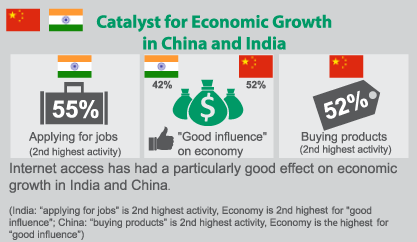
While the internet definitely deserves accolades for its positive effects in these emerging countries, many users still remain skeptical. On average, 42% of adult users think internet usage has had a bad influence on morality—the highest compared to bad influence on other areas. These insights showed not only how complex the effect of internet usage has been on these countries, but also just how complex the issue of “well-being” can be—especially the gap between what people do versus what they think! Overall, we think the internet has a lot of potential to benefit these emerging countries. Time (and more data!) will tell.
Check out our infograph below!
